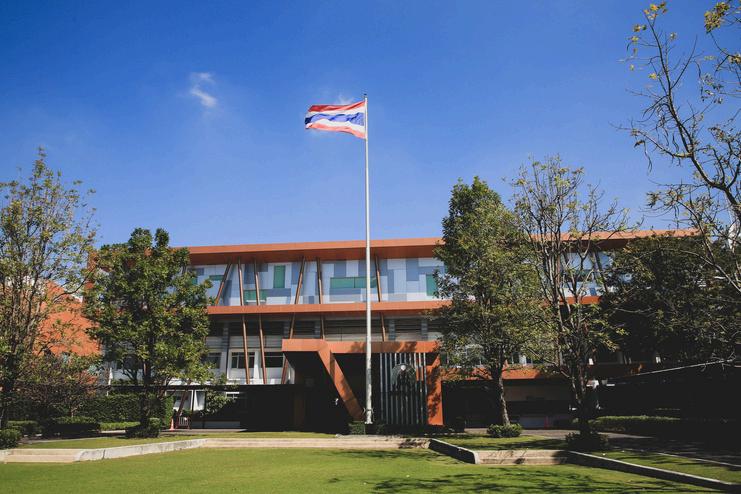






Learn about our unique context as a British international school in the Kingdom of Thailand
Hear from our Head of School - Chris Sammons
Our current community
Key achievements and developments in 2023/24



Bangkok Patana School is a British international school based in the Kingdom of Thailand As such we are governed by Thai law and the Constitution of the Kingdom of Thailand B.E.2560 (2017) Sections 4,27 and 68.
We reference the following global laws and conventions to inform our approach to DEIJ work:
United Nations Universal Declaration of Human Rights of 1948



A high proportion of students join in Foundation Stage and remain with us for their entire school journey to Year 13, so too do many staff remain here for large parts of their career Alumni often return to Bangkok Patana School with their own children seeking the same standards of care and education which they enjoyed.
As a result, the values of the Bangkok Patana Community have been passed to each new generation since 1957 DEI work sits at a key intersection between those values of WellBeing, Learning and Global Citizenship
Well-Being


Our school community has over 60 different nationalities We commit resources to build a curriculum that enables learners to honour their home language, to acquire new languages and to become fluent in E volunteer their time freely to share each o uently held on our site We have drawn f e International Baccalaureate to guid rous, develop different types of thin
To the best of our ability, inclusion and e eds, creating pathways of learning
Global Citizenship
“Each to his upmost” aw ire through the lens of DEI School lea ir international classrooms and recog forms for all of their children. This vision w ensure its fullest intention, that “studen al” As social, political and economic change ps knowledge and skills which enable ou throughout their lives.
Bangkok Patana




2345 Students, 695 Staff
67 Passport Nationalities
Largest Groups: Thai, British, USA and Chinese
We have 7 specialist teams, comprising 76 staff, who help to personalise learning for students with diverse needs.
(Teacher Assistants, SfL, LS, EAL, SALT, Enrichment, Extended Learning and Counselling)
Youngest Student - 2 years
Oldest Student - 18 years

82 Languages Spoken
Self-Reported
28.53% of our Students are Dual Nationality
50% Boys and 50 % Girls
9 Faiths Practiced
Self-Reported
Throughout the last academic year our achievements included:
Ongoing development of the Patana Diversity calendar and linked greetings.
Creation of guidance for school leaders of DEI iniativies and those managing incidents.
Whole school communications review
Expanded programme of DEI learning linked to International Day, entitled, “Our Story”
Curriculum DEI pilot audit in Secondary Geography. Development of explicit DEI themed units in Primary PSHE and Secondary Well-being
A highly successful and moving diversity themed spoken word poetry showcase in Secondary
The introduction of a new range of student choices with regard to PE kits, including shorts, leggings and skorts.
Expansion and improvement of our toilets and changing areas for students with a disability


As we look ahead, here are our key goals:
To deliver staff training to equip our staff to review our instructional materials and pedagogical approaches to ensure they meet the needs of our diverse student body.
To offer a cross campus student art competition, entitled, “Our Story” linked to International Day.
To encourage shared ownership of the weekly staff Diversity Digest by facilitating guest contributors from across the campus.
To conduct a review of the written, taught and hidden curriculum communited by our major DEI themes school events - International Day, World Peace Day and International Mother Tongue Day
To continue our popular World Cafe series for staff, this time exploring the question, “How does our curriculum guard against Identity Based Harm?”
To review the Primary School uniform through the lens of inclusion and student choice, with an aim to evaluate the need for additional uniform items
To develop a bespoke library collection to support the IBDP World Studies EE’s located in Secondary Humanities.
To work alongside admissions to ensure our online application portal and any hard copy forms, including those used during academic assessments are as inclusive and accessible as the law allows.
To consider ways in which we can support students and staff who express an interest in engaging in personal religious worship and fasting whilst on campus.
To continue to develop our culturally sensitive guidance for the community around how to support students through difficult local and global events
To better understand the knowledge, skills and practice of our staff and leaders around Menopause better, and to ascertain if further actions are required.



Anthony Casey ancs@patana ac th

Lisa Steciuk list@patana.ac.th

Stephen Murgatroyd stmu@patana ac th

Joe O’Neil joon@patana ac th

Celine Corenq ceco@patana.ac.th

Emma Willinger emwi@patana ac th

Purnima Ghogar pugh@patana.ac.th

Carly Peart cape@patana ac th
Cindy Adair ciad@patana ac th

Jack Davison jada@patana ac th

Karel De Cock kade@patana.ac.th


Collette Blackman cobl@patana ac th

Roshanak Lashkari rola@patana.ac.th
The acknowledgement that our community has many different individuals, who have their own unique strengths and perspectives to share. These perspectives will be shaped by their intersecting identities, which may include; Race; Nationality; Age; Sexuality; Disability/Neurodiversity; Language Background; Gender; Faith, Socio-Economic Class and life experiences more generally.
Equity refers to the goal that each community member receives access to the resources, opportunities, and educational support they need to succeed, regardless of their background or circumstances. It involves creating a learning environment where all students can thrive and reach their full potential. Equity differs from equality, which suggests all community members need the same provision; however, we know that this is not the case.
Inclusion is the act of ensuring all members of our community feel welcome and over time develop a sense of belonging. This means we commit to ensuring everyone has a voice, feels safe and that there is equity of opportunity in our curriculum, when moving around our campus and when participating in our extra-curricular and community activities.
Justice involves making sure everyone is treated fairly This usually means following a set of agreed rules, so that everyone feels respected and cared for When a community member is careless with their words or actions, we enact a process of restorative justice to help them understand the harm that may have been caused and the actions for resolution This may also involve age-appropriate education about history and global geo-politics as we aim to develop global citizens.



